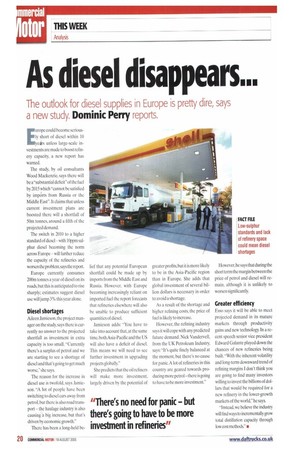As diesel disappears...
Page 20

If you've noticed an error in this article please click here to report it so we can fix it.
The outlook for diesel supplies in Europe is pretty dire, says a new study. Dominic Perry reports.
Elurope could become seriousy short of diesel within 10 eis unless large-scale investments are made to boost refinery capacity, a new report has warned.
The study, by oil consultants Wood Mackenzie, says there will be a "substantial deficit" of the fuel by 2015 which -cannot be satisfied by impOrts from Russia or the Middle East". It claims that unless current investment plans are boosted there will a shortfall of 50m tonnes, around a fifth of the projected dem and.
The switch in 2010 to a higher standard of diesel with lOppm sulphur diesel becoming the norm across Europe will further reduce the capacity of the refineries and worsen the problem, says the report.
Europe currently consumes 200m tonnes a year of diesel on its roads, but this is anticipated to rise sharply: estimates suggest diesel use will jump 3% this year alone.
Diesel shortages Aileen Jam ieson, the project manager on the study, says there is currently no answer to the projected shortfall as investment in extra capacity is too small. "Currently there's a surplus of petrol and we are starting to see a shortage of diesel and that's going to get much worse," she says.
The reason for the increase in diesel use is twofold, says Jamieson. "A lot of people have been switching to diesel cars away from petrol, but there is also road transport the haulage industry is also causing 'a big increase, but that's driven by economic growth."
There has been a long-held be lief that any potential European shortfall could be made up by imports from the Middle East and Russia. However, with Europe becoming increasingly reliant on imported fuel the report forecasts that refineries elsewhere will also be unable to produce sufficient quantities of diesel.
Jamieson adds: -You have to take into account that, at the same time, both Asia-Pacific and the US will also have a deficit of diesel. This means we will need to see further investment in upgrading projects globally."
She predicts that the oil refiners will make more investment, largely driven by the potential of greater profits, but it is more likely to be in the Asia-Pacific region than in Europe. She adds that global investment of several billion dollars is necessary in order to avoid a shortage.
As a result of the shortage and higher refining costs, the price of fuel is likely to increase.
However, the refining industry says it will cope with any predicted future demand. Nick Vandervell, from the UK Petroleum Industry, says: "It's quite finely balanced at the moment, but there's no cause for panic. A lot of refineries in this country are geared towards producing more petrol -there is going to have to be more investment." However, he says that during the short term the margin between the price of petrol and diesel will remain. although it is unlikely to worsen significantly.
Greater efficiency Esso says it will be able to meet projected demand in its mature markets through productivity gains and new technology. In a recent speech senior vice president Edward Galante played down the chances of new refineries being built. "With the inherent volatility and long-term downward trend of refining margins I don't think you are going to find many investors willing to invest the billions of dollars that would be required for a new refinery in the lower-growth markets of the world," he says.
"Instead, we believe the industry will find ways to incrementally grow total distillation capacity through low cost methods." •
















































































































































































































